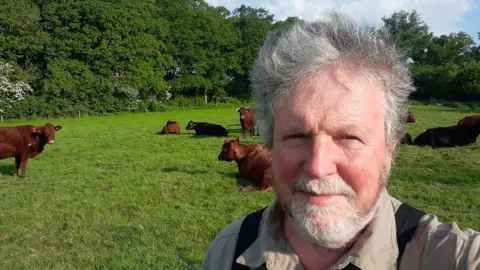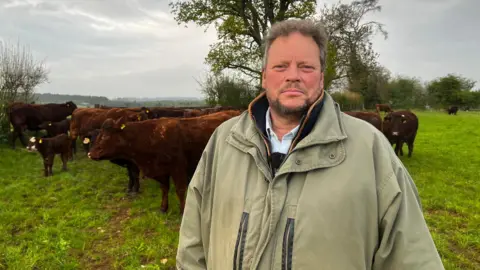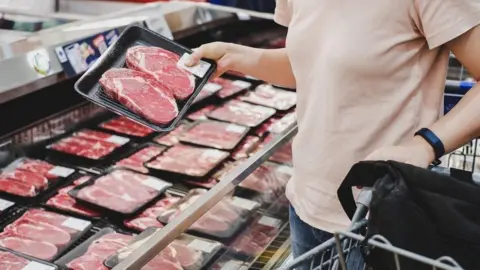Beef farmers welcome US deal but want more clarity
 Adam Quinney
Adam QuinneyLivestock farmers have offered a cautious welcome to the UK-US trade agreement on beef.
Adam Quinney, who farms at Sambourne on the Warwickshire-Worcestershire border, said the agreement, reached last week, was unlikely to lead to the widespread sale of American beef in UK supermarkets.
But he said it could potentially have an impact on trade with other countries.
"It would be a concern if the trade barriers with Europe were made even more difficult than they are now," Mr Quinney explained.
Very little US beef has been sold in the UK since 1989, when most of it was banned because of concerns about the use of growth hormones.
Last week, Sir Keir Starmer and Donald Trump shook hands on a mutual export quota of 13,000 tonnes of beef - one of a number of new tariff agreements agreed by the two leaders.
Following the deal, the government said "the rules on food standards have not changed", and hormone-treated beef would not appear in the UK.
"We were worried about standards, and what type of beef can be imported. And as more and more details come forward, it appears that it's quite sensible," Mr Quinney said.
"It's hormone-free beef."

But David Barton, Cotswolds farmer and livestock chair of the National Farmers' Union (NFU), said the lack of a national cattle tracing system in the US was a concern.
"We have incredibly good traceability in the UK," he said. "Every animal on my farm has a cattle passport from the moment it's born.
"So wherever it goes, it can be traced right back to me. Do they have that in the US? I don't think they do.
"We need to make sure that there are robust, rigorous procedures in place that we're confident that it'll be their non-hormone product."
'Product largely grass-fed'
The Department for Environment, Food and Rural Affairs (Defra) says US producers must have monitoring and certification procedures in place to prove they are compliant with UK food standards.
However, Mr Barton said the deal would benefit UK beef producers - who had long been keen to trade with the US.
"Our product is largely grass-fed," he explained. "It's a premium product, and it doesn't carry the amount of fat that the US product has. So the US are always looking for lean beef to mix with their product.
"So there will be opportunities."
 Getty Images
Getty ImagesAlthough Mr Quinney's initial fears have been allayed, he is still worried that any perception of lower standards could eventually impact trade with the EU - the UK's biggest beef export market.
"We apply to European standards here," he explained. "Does that mean that countries around the world will go: 'Hey, Britain's dropped its standards on imports - that means our cattle can get there'?, which would come in way below the type of standards that we have in the UK.
"And that would accentuate the difference between us and Europe."
Also of concern, said Mr Quinney, was the aspect of the deal which allows more American ethanol to be imported into the UK - which could affect not only the homegrown ethanol market, but also cattle farmers who use the by-products of production to feed their herds.
Ultimately, though, Mr Quinney thinks the average consumer is unlikely to see US beef appearing alongside UK cuts in the meat aisle.
"[American beef] is quite expensive," he said. "You've got to ship it across the Atlantic, so it's going to go into those premium markets."
Follow BBC Hereford & Worcester on BBC Sounds, Facebook, X and Instagram.
